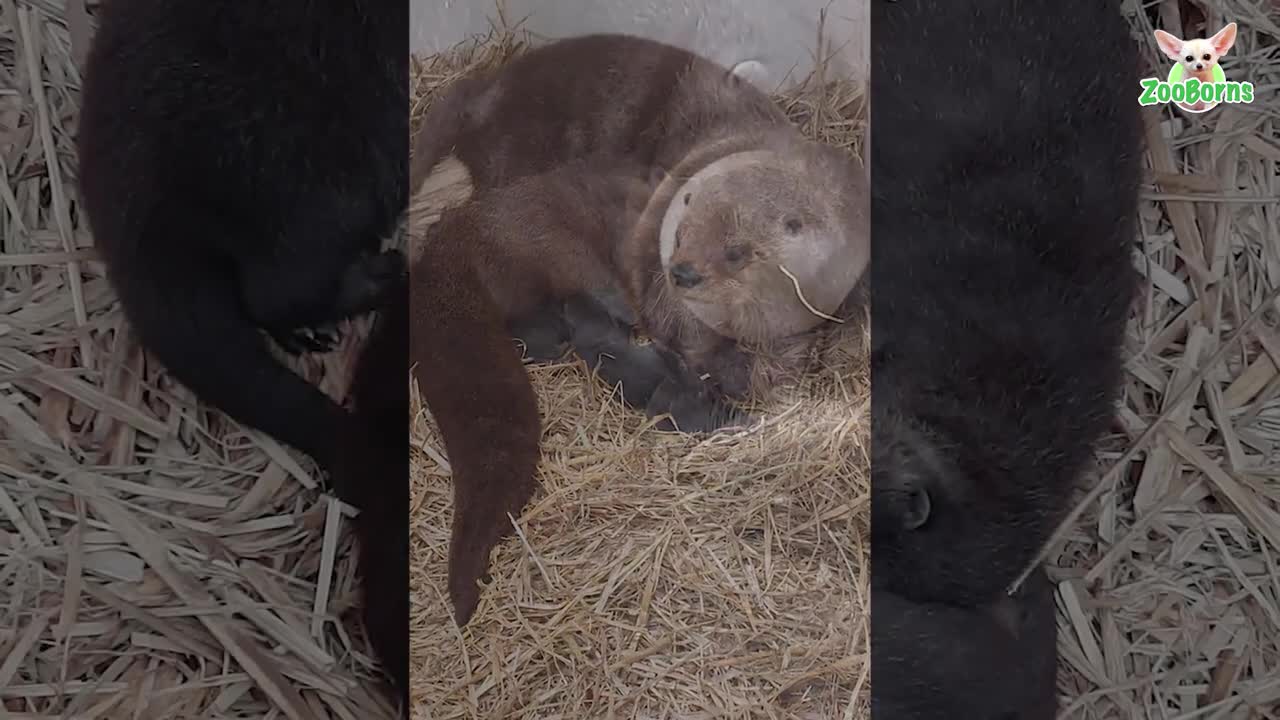Premium Only Content

Triple The Love - Stone Zoo Welcomes Three North American River Otter Kits!
Births are a first for Zoo New England’s Stone Zoo
Stoneham, Mass.: March 10, 2022: @Zoo New England is thrilled to announce its newest addition of otterly-adorable residents – a trio of North American river otter kits born February 16.
Born to first-time mom, Dunkin, the kits are doing well and are bonding with their mother behind the scenes. For the first several months of their lives, North American river otter kits are completely dependent on their mother and spend time in their den under her watchful eye. Stay tuned to our website at StoneZoo.org and Facebook (https://www.facebook.com/stonezoo/) for updates on the kits as they continue to grow and reach milestones.
“We are so excited about the birth of these kits, which is a first for Zoo New England,” said Pete Costello, Assistant Curator of Stone Zoo. “As with any new birth, we are closely monitoring mom and babies. Dunkin is doing great and allowing the kits to nurse often. She’s a pro for a first time mom.” Costello added that Dunkin, age four, is displaying protective maternal instincts, saying “she likes to hide the kits when we’re around, so she covers them in hay.”
Zoo New England participates in the North American River Otter Species Survival Plan, which is a cooperative, inter-zoo program coordinated nationally through the Association of Zoos and Aquariums. SSPs help to ensure the survival of selected species in zoos and aquariums, most of which are threatened or endangered, and enhance conservation of these species in the wild. The otter kits are the result of a recommended breeding between Dunkin and Sushi, a 16-year-old otter who recently passed away due to age-related issues.
North American river otters weigh around 4 ounces at birth and will grow to between 10-30 pounds. Kits are born blind and toothless, and are totally dependent on their mother. The kits will start swimming generally between 28-56 days and start walking at 35-42 days. During this time, they will begin to play on their own, but they won’t leave the den and security of their mother for several more weeks.
Otters are excellent swimmers and divers, capable of speeds of seven miles per hour. They can stay under water for up to eight minutes. Layers of fat provide otters with insulation against frigid water and cold air temperatures, while their thick hair forms a waterproof outer layer to protect the otter's undercoat.
Otters are indicator species for the health of the bodies of water where they live. They avoid contaminated areas, so if you see otters in the wild you’re likely observing a healthy and clean ecosystem.
-
 1:02:29
1:02:29
The Rubin Report
2 hours agoTrump Goes in Expletive-Filled Tirade Over Israel & Iran Messing Up Ceasefire Agreement
97.4K32 -
 LIVE
LIVE
Flyover Conservatives
2 hours agoSettler vs. Immigrant: The Language War That Rewrites History - Wade Stotts | FOC Show
380 watching -
 LIVE
LIVE
TheAlecLaceShow
1 hour agoGuest: Dinesh D’Souza | Trump Drops F-Bomb on Israel & Iran | MAGA Divided | The Alec Lace Show
114 watching -
 LIVE
LIVE
Rebel News
42 minutes agoCarney's 'new world order', Smith launches Alberta Next panel, Trump the peacemaker | Rebel Roundup
366 watching -
 1:00:54
1:00:54
VINCE
4 hours agoA New Middle East: Did Trump's Gambit Pay Off? | Episode 71 - 06/24/25
229K105 -
 1:55:47
1:55:47
Benny Johnson
3 hours agoFURIOUS Trump Drops F-BOMB on Live-TV | Rages at Israel, Iran For Attacks After Peace Deal: 'F***'🤬
74.1K81 -
 1:11:55
1:11:55
The Big Mig™
7 hours agoCEASEFIRE?….NOPE! Whats Next?
20.9K14 -
 LIVE
LIVE
LFA TV
15 hours agoLFA TV ALL DAY STREAM - TUESDAY 6/24/25
2,414 watching -
 LIVE
LIVE
The Shannon Joy Show
3 hours ago🔥🔥Trump Doesn’t Know What F*@% He’s Doing But He Sure Is F*@%ing America - Trump’s Land Heist & The Great Sellout Of USA With Special Guest Derrick Broze🔥🔥
351 watching -
 1:33:26
1:33:26
Caleb Hammer
2 hours agoHe’s More Disgusting Than Boogie2988 | Financial Audit
13.5K